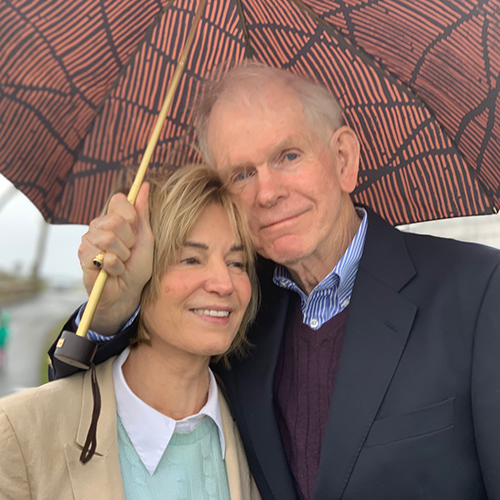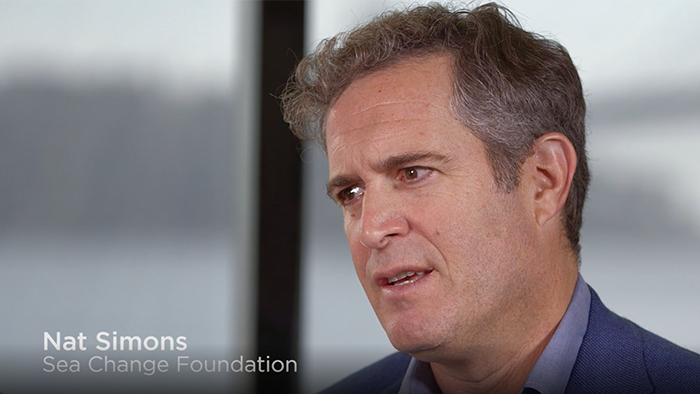
Jeremy and Hanne Grantham
This is a winnable war (against environmental damage) if we live up to our capabilities, but at the moment we are still losing. With your help we might perhaps just tip the balance."
Pledge letter
Dear Fellow Signers of the Giving Pledge,
Hanne and I are happy to join your group. What can be said against philanthropic giving? The more the merrier. But we do join on the understanding that we are here to beg our fellow members to increase their commitments to protecting nature and in so doing the well-being of our own species.
It is a blessing to have a purpose in life and we today are in a perverse sense lucky that we have been presented with a cause or a series of causes of supreme importance: our biodiversity is collapsing under the impact of human development, especially the need to feed a rising population that has more than tripled in my lifetime. This impact includes deforestation, intense monoculture and increasing use of chemical pesticides, up over 20-fold globally in the last 60 years. Insect populations have crashed everywhere, with possible extreme long-term consequences for all wild nature and agriculture, especially pollination. The increasing use of chemicals in agriculture and to a lesser degree in other consumables has led to extreme disruption in hormonal activity in humans and has reduced human sperm count to about one third of its prewar level, at a rate of 1.9% decline a year that shows no sign at all of deceleration. At such a rate in 10 or 12 years the average couple would be advised to seek medical help!
Intensive monoculture has also required increasing use of two very finite mined resources—potassium (potash) and phosphorus (phosphate) without which no life of any kind can be produced, plant or animal. This is the epitome of unsustainable growth and should remind us of Kenneth Boulding’s quote (an English economist) in the 1950’s “anyone who believes exponential growth can go on forever in a finite world is either a madman or an economist”.
To rub in the dangerous nature of this dependence, Morocco has 75% +/- 10% of all the world’s high-grade phosphate, a level of potential dominance that should make OPEC turn green with envy.
Most important of all in this list of damage from unsustainable agriculture is the story of erosion, where 1% a year of our soil has gone missing for decades, so that we are down to one third of what we had in many formerly excellent locations and others have been forced out of farming with a loss of about ½% of all farmland each year. It is calculated that we have only 30 to 70 good crop years left with current practices, depending on location.
The main consequence of growth at any price and without constraint is the growing tide of waste. This starts with the very visible increase in plastics on land and ocean. It also involves the compounding growth of CO2 and Methane, the waste products of fossil fuels, that cause increased temperatures on land and sea and have done so at a steadily accelerating rate. This in turn has caused weather patterns to become destabilized with rapid increases in severe droughts, mainly from heat waves drying out soils, and much faster increases in heavy flooding which in addition to its immediate damage to farming and life in general also strongly accelerates erosion.
In addition to greenhouse gases, burning of fossil fuels, especially coal and diesel, increases the amount of toxic compounds several of which cause developmental and other health problems.
In short, we are rapidly moving towards a desperate situation and one which has been worsened by clever but malevolent and short-sighted tactics of the fossil fuel and chemical industries to deny all these downsides, create as much doubt as possible, and use their incredible and recently much increased power to influence government.
The note of hope here has been in the speed of progress in the technologies to decarbonize, and without full decarbonization of energy in the next few decades our relatively stable global society of the last 70 years will certainly fail.
But brilliant potential research is slowed down or put on the waiting list for the lack of money. Government and corporate Research & Development has become completely insufficient since in recent decades corporate efforts have moved almost entirely away from basic research. Yet we already have the technologies to succeed if they are strongly supported. We do not have to wait for a silver bullet. And we do not have the time to wait. At any time now, we may pass a point of no return as some factor becomes self-reinforcing: tundra for example melts and gives off CO2 and Methane (60 times worse than CO2) which further increases the temperature. And even as we push forward with current technologies they will continue their recent rapid progress in lower costs and greater efficiency.
Both problems and opportunities need your help. If we fail on climate change and toxicity all of our efforts to improve culture, health and education will be at best under cut and at worst, swept away. Yet, climate and nature in general receive an almost incomprehensibly low 2% of our philanthropy. What are we thinking of? We walk towards the edge of the cliff offering our funds to established and comfortable causes rather than trying to prevent our new existential threats.
We should view our efforts on climate change and toxicity not as philanthropy but as vital investments in our grandchildren, in our civilization, in the pleasant world we inherited and appear to be throwing away, and in our very survival as a species. This is a winnable war if we live up to our capabilities, but at the moment we are still losing. With your help we might perhaps just tip the balance.
Yours Sincerely,
Jeremy and Hanne Grantham

